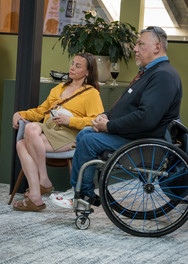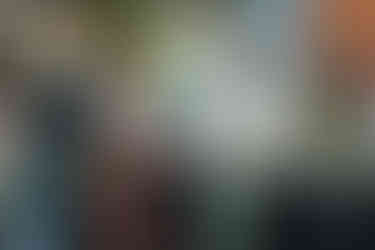Connection: The Power of Community-Based Research Networking event a collective success!
- Carmen Smith
- Jun 24, 2025
- 4 min read
Updated: Jun 25, 2025
Celebrating a Successful Networking Event!

We are thrilled to share the success of our networking event held on May 8th at the Kwench Co-working space in beautiful Victoria, BC. With over 115 RSVPs, we were delighted to welcome over 90 enthusiastic attendees who made the event truly special.
A Diverse Gathering
This event brought together a remarkable mix of individuals, including representatives from:
First Nations
Academia and Researchers
The nonprofit sector
Multiple levels of government
The diversity of perspectives and experiences contributed to enriching conversations and valuable connections.
We are so grateful to have had engaging displays from the UVIC Map Shop, Engage with Nature-based Solutions, What's the RUSH, UVIC CIFAL, Victoria Foundation, the Victoria Native Friendship Centre, and the Royal BC Museum's Living Cultures and Living Archives initiative.
Event Highlights
You could feel the energy as attendees engaged in meaningful discussions, shared insights, and planted the seeds for future collaborations. Conversations where ideas and inspiration were being exchanged that could have a lasting impact on our communities were happening all around. It is incredible what happens when you provide a space for passionate individuals committed to making a difference in our communities in the Salish Sea to come together. This work always starts from community-building and conversations.
Dr. Wanosts'a7 Lorna Williams opened our speeches that evening with a land acknowledgement and prayer. Dr. Wanosts'a7 Lorna Williams has been an advisor and mentor to the Salish Sea Hub, and we were so lucky to have her open our event in this way. We then heard inspiring stories from the people and organizations who helped found the Salish Sea Hub, including:
Rajesh Tandon, Co-founder of the Knowledge for Change Global Consortium
Crystal Tremblay, Founding Member and Mentor, Salish Sea Hub
Tanya Clarmont, Founding Member and Mentor, Salish Sea Hub
Anne-Marie Daniels, lead for What's the RUSH, a project partner with the Salish Sea Hub
Ron Rice, Executive Director, Victoria Native Friendship Centre
Carol Hall, Senior Director of Innovation and Impact, Victoria Foundation
Lois Harder, Dean of Social Sciences, University of Victoria
What we heard from participants:
Upon arrival at our event, participants were greeted by Salish Sea Hub leadership team members. In addition to their name badges, they were also provided with a pencil and sticky notes and encouraged to participate in community listening stations throughout the room.
We asked several questions to participants around the room that evening to help shape the learning resources and training offerings we are creating for the community around community-based participatory research (CBPR). Here is a summary of what we heard from these stations:
Engaging Communities | Tools and Resources | CBPR Training Development |
What does successful community engagement look like? | What tools and resources do we already have to engage communities? | What does CBPR training look like for you? |
The community has a voice, benefits equally & feels included ++++ | Art of hosting & artful hosting | Basics of what CBPR is |
Care & reciprocity ++ | Cultural & Ecological sites (engaging & accessible) | Ethics in STEM engagement + ; Tips and practical steps to follow for ethical engagement |
Individuals having their voices heard within the collective | Storytelling & Sharing | Elementary media, such as comic books, picture books, TV, etc. to aid with language revitalization |
Diverse, equitable, sincere, authentic, inclusive, place-based and cultural + | Photo-voice community (Hub Mind) | Resources, a database of community organizations - who is connected and how we can identify gaps |
Everyone knows how - and where - they can participate and contribute | Collective dreaming and brainstorming space for possibilities with trainees ++ | |
Sharing findings, what we heard, action & next steps | How to connect with hereditary leadership + | |
Make it fun & accessible | How to continue to evolve, grow and adapt programs | |
Building upon successful approaches to engage communities looks like: | What tools and resources would you like to have? | What would the training look like? Who would teach it? What format would it be in? How much time could you commit to it? |
Uses First Nations Principles of Ownership, Control, Access and Permission (OCAP) | More gender inclusive tools that resonate with women and marginalized communities ++ | In person ++; place based + ; Hybrid format ++ |
Community stewardship, events, convening early | How to adapt CBPR when working with remote communities | An all-day intensive format lasting 1-3 days |
Indigenous circles as culturally safe spaces | Relationship-building opportunities | I'd commit 6-10 hrs per week |
Include decision-makers from all levels of government, but keep it apolitical. | Internships for CBPR | Max. 8 weeks for multi-week commitment |
Going to the people - meet them where they are | Access to government and corporate resources for philanthropy | Instructors should be versed in cultural knowledge and protocols + |
Working with the new Indigenous Education program at UVIC | Support for hosting a session with the community before starting CBPR research to learn and connect | Instructors should facilitate discussion, not necessarily knowing the answers; someone who will ask thought-provoking questions |
Funding resources, tips, and toolkits | Instructors should have knowledge and experience in building meaningful community connections | |
Tools that empower leaders & develop new community leaders | Arts & land-based activities, conversations, play |
What's Next?
We want to hear from you!
If you have:
Resources that would be helpful to others wishing to use CBPR methods to engage with communities in the Salish Sea - email us to include these in our open-access, digital Knowledge Hub (under construction)
Projects that require some support from a CBPR practitioner or resources. We will help connect you with the people and tools to help you succeed.
Ideas for specific types of training you would like us to create or develop (e.g. community mapping how-tos, youth engagement toolkits, or others).
We are busy developing community training for nonprofits, government agencies, and First Nations communities, which we hope to pilot in early 2026. We will be reaching out to you all for ongoing feedback and input on this journey, so keep an eye on your email inboxes and be sure to register to receive updates from us on our website.
Thank You!
Below is a collection of photos taken by Salish Sea Hub Mentor Sebastian Silva at the event. If you wish to download any, you may do so from the images below or our events page here.









































































































Comments